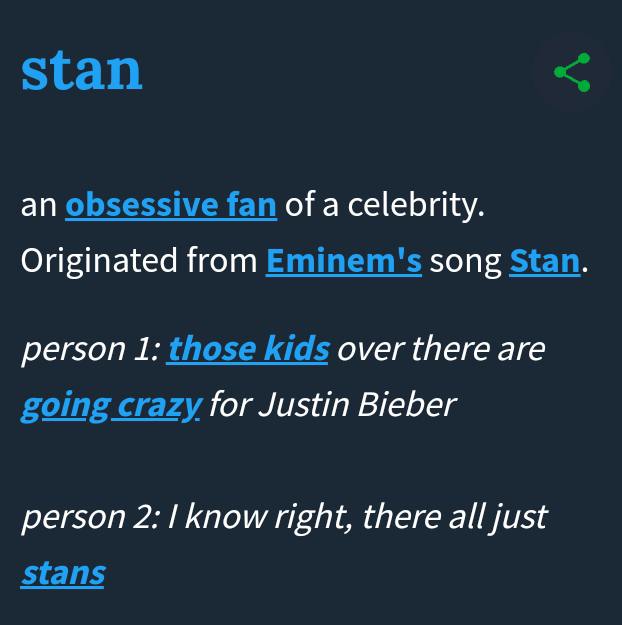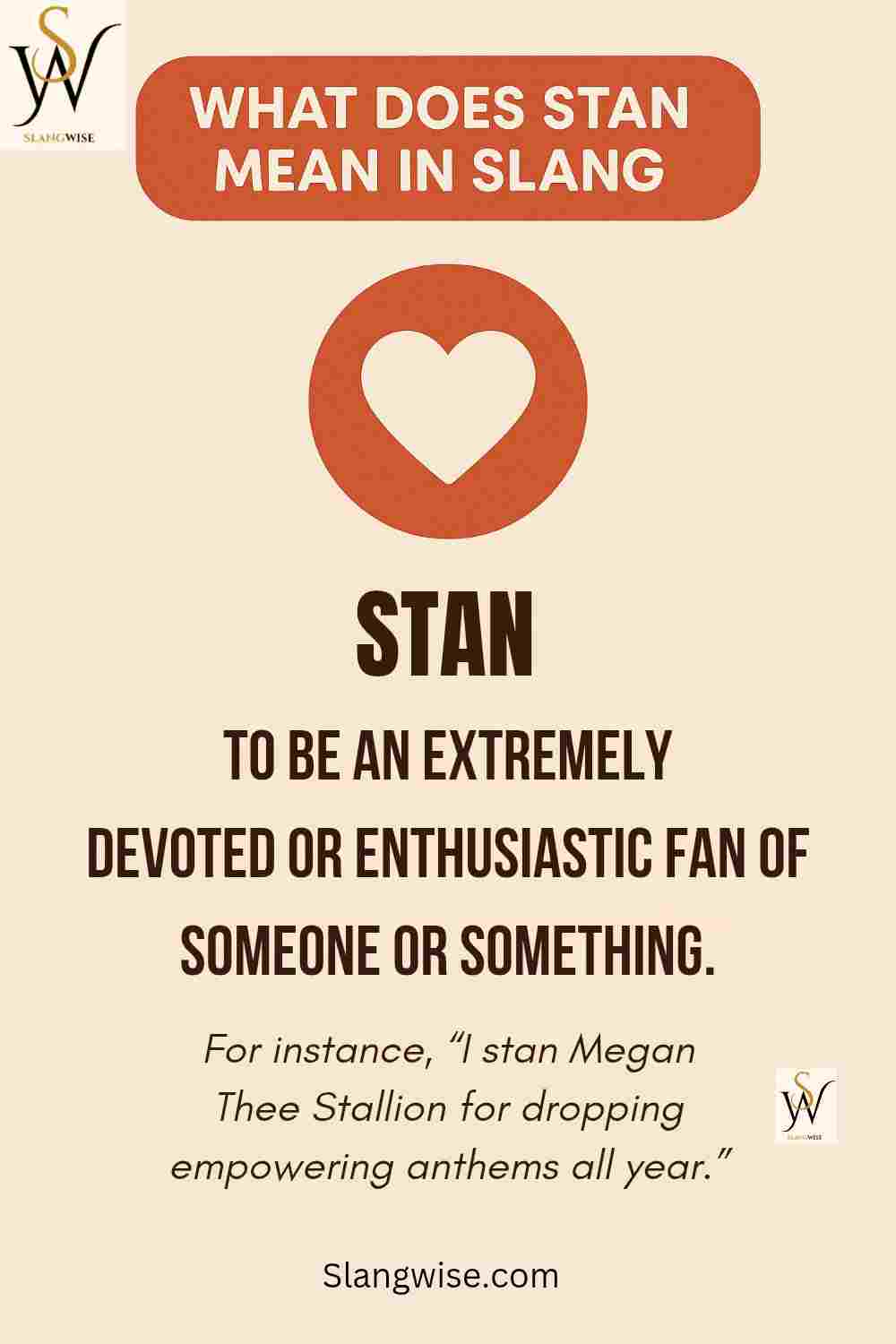In today’s fan-driven culture, the verb stan has become a badge of devotion. For Instance, saying “I stan Beyoncé” or “We stan a hero” signals fervent support beyond casual fandom.
Yet, this slang carries a rich backstory, from tragic song lyrics to Twitter tributes, and reflects how online communities elevate passion into identity.
In this article, we’ll explore what stan means, trace its origins, survey its rise in pop culture, and outline smart ways to use it without veering into obsessive extremes.
Slangwise Tip: To stan responsibly, balance your enthusiasm with boundaries, celebrate your favorites without losing yourself.
Table of Contents
Key Takeaways
- Stan = Superfan: A blend of “stalker” and “fan,” indicating intense admiration.
- First appeared in Eminem’s 2000 song Stan. A cautionary tale of obsession.
- Adopted by online communities (Tumblr, Twitter) by the early 2010s.
- Versatile usage: From celebrities to causes and everyday heroes.
What Stan Means in Slang
To stan someone means to be an extremely devoted fan, often defending them fiercely online.
- As a noun, a stan is that superfan: “She’s a stan for every Marvel movie.”
- As a verb, it conveys active support: “I stan that underdog team.”

Stanning transcends mere liking, it implies emotional investment, community involvement (fan art, tweets, fanfiction), and sometimes defensive behavior against critics.
Origin/ How Stan Came To Be
- Eminem’s 2000 Hit Stan
- The term originated from Eminem’s song Stan, which tells the story of a fan named Stan whose obsession leads to tragedy.
- Lyrics like “My tea’s gone cold, I’m wondering why I …” illustrate unhealthy fixation.
- Early 2000s Internet Forums
- Fans began adopting stan ironically, referencing the song’s cautionary message on discussion boards.
- Tumblr & Twitter Adoption (2010–2015)
- Tumblr fandoms embraced stan to express ardent support, often in hashtags (#TeamFooStan).
- By 2014, Twitter users routinely tweeted “I stan” to show solidarity, popularizing the term.
Reference: Oxford Dictionaries added stan in 2017, defining it as “an overzealous or obsessed fan” and referencing the Eminem song.
Read More: Stan is on our list if the 65 top trending TikTok Slangs of 2025. Check out the other slangs on the list.
Stan in Pop Culture
The broad adoption as seen below demonstrates stan’s flexibility: from lighthearted devotion to earnest advocacy.
- K-Pop Fandoms: K-pop communities are among the biggest stan hubs, coordinating streaming parties and fan projects.
- Sports Fans: “I stan the Lakers” expresses deep allegiance to a team’s legacy.
- Social Movements: “We stan survivors” conveys solidarity in #MeToo and mental health campaigns.
- Everyday Heroes: “I stan nurses” emerged during the pandemic to honor frontline workers.
When Stanning Goes Too Far
While stanning can foster community and positivity, it can cross into toxicity when:
- Harassment of Critics: Attacking anyone who questions or dislikes the stan target.
- Echo Chambers: Isolating oneself in fan bubbles and dismissing outside views.
- Loss of Perspective: Prioritizing fandom over personal well-being or relationships.
Slangwise Tip: Keep your stan energy healthy, support without silencing others or neglecting self-care.
How to Use Stan the Right Way
- Express Genuine Admiration: “I stan her songwriting skills”, focus on specific qualities.
- Join Positive Communities: Connect with fellow stans for fan art exchanges or charity drives.
- Avoid Defensiveness: Welcome civil discussion, even from critics.
- Balance Passion & Moderation: Enjoy your stan identity without letting it dominate your life.
Examples of Stan in Action
Example 1 (Twitter): “I stan Megan Thee Stallion for dropping empowering anthems all year.”
Example 2 (Tumblr Tag): “#Stan BTS for making every album a masterpiece.”
Example 3 (Reddit Comment): “We stan a queen: long live Diana Ross.”
Example 4 (Instagram Bio): “Stan Olivia Rodrigo 💖”
Conclusion
The slang stan has journeyed from a cautionary rap tale to a celebratory fan identity. It captures the energized spirit of online communities that rally around beloved figures and causes.
By understanding its origins and applying it thoughtfully, you can join these communities, express genuine support, and maintain a healthy fandom.
FAQs
It depends on tone. As a compliment, it praises dedication. As an insult, it implies unhealthy obsession.
A fan enjoys; a stan lives and breathes support, often engaging in community activities like streaming and fan art.
Absolutely. You can stan anyone you admire, teachers, coaches, community leaders, even fictional characters.

